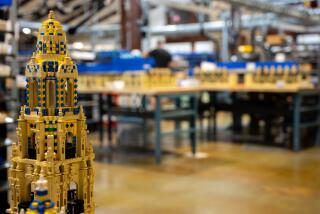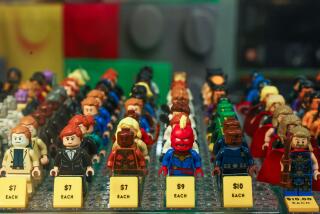Opinion: Will Lego’s ‘female scientists’ inspire girls to enter STEM fields?
- Share via
Lego, the Danish manufacturer of colorful plastic bricks, has finally caved, er, responded to years of feminist carping over supposed gender stereotyping in its “minifigures” and now has a boxed set of “female scientists” that’s presumably marketed to little girls (or at least to their feminist mothers).
The yellow-skinned, knob-headed plastic females in the set, which Lego titles “Research Institute,” look exactly like male Lego figures, except they sport bouffant hairstyles that, besides Bruce Jenner, no man would be caught dead with. By putting together the lady astronomer (with telescope), the lady chemist (with miniature lab) and the lady paleontologist (with a magnifying glass and dinosaur skeleton), little girls -- inspired by their plastic role models -- will presumably develop cravings to enter STEM fields when they grow up and thus cure the chronic underrepresentation of women in those fields.
This new, politically correct set hasn’t put an end to the feminist complaints about Lego after the company, whose market research had revealed that 90% of its users were boys and men, in 2011 launched a line specifically for little girls called “Friends.” The Friends minifigures -- which today are Lego’s fourth-best-selling line, were slender instead of silo-shaped, came in skin tones that matched a range of actual human skin tones and wore stylish outfits in girly shades of pink and purple. Instead of messing around in the chem lab, the Friends engaged in -- and continue to engage in -- such distinctly non-STEM careers as hairdressing, taking care of horsies and running pastry shops.
Feminists hate the Friends line. A 2012 petition on Change.org accused Lego of promoting “body dissatisfaction” and demanded that Friends be discontinued. Other feminists asserted that the Friends line promoted eating disorders.
But even the Lego female scientists haven’t managed to placate the feminists. For it seems that at the same time that the chemist, the astronomer and the paleontologist made their debuts, Lego introduced a Bavarian pretzel girl, a diner waitress, a grandma with shopping bag and a lady robot among its regular minifigures, which got the complaints about sexism back in gear. Helen Czerski wrote on June 6 for the Guardian:
“Denmark, where Lego is based, is famed for being better at gender equality than most other countries. Yet this year, it has produced a toy range that has traditional alpha male heroes and traditional helpless (and bossy) females. That is undoubtedly damaging to both young boys and young girls, and also to the future of society.
“All right, Lego, maybe it’s not your job to dictate culture and produce female mountain climbers. But then don’t dictate culture by making female pretzel girls. Lego is modular. It is perfectly designed for avoiding this issue, because you can just make all the bits (hair, spears, burgers etc.) and let children put them together for themselves. Why impose the stereotypes on them at all?
“If only Lego had left out pretzel and diner girls and added a female mountain climber and a female constable.”
Sigh. You just can’t please a feminist.
Of course it could be said that that the three Lego female scientists, each of them garbed in baggy slacks and shapeless tops, also promote negative gender stereotypes: that women who go into science have bad hair and no fashion sense. At least the pretzel girl boasts a cute dirndl and a fetching long braid. Now, if you’d just put a microscope into her other hand, she might make a STEM role model that girls might want to identify with.
Charlotte Allen writes frequently about feminism, politics and religion. Follow her on Twitter @MeanCharlotte.
More to Read
A cure for the common opinion
Get thought-provoking perspectives with our weekly newsletter.
You may occasionally receive promotional content from the Los Angeles Times.









